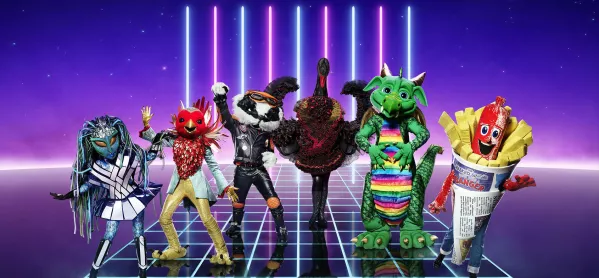Why post-lockdown school is like The Masked Singer

Lockdown does funny things to people. I’ve never been a particular fan of Saturday night light entertainment, at least not since Noel Edmonds threw his last house party. Yet, over the past few months, I found myself sucked into the weird and wonderful world of ITV’s hugely successful The Masked Singer.
If you’ve never seen it, the general premise is this: celebrities dressed in the most bizarre get-ups imaginable sing from behind a mask and other, increasingly excitable, celebrities try to guess who they are. It is as ludicrous as it sounds and yet oddly compelling.
The Masked Singer may have sadly finished until the next series, but school leaders only have to walk the corridors of their school to get that same feeling of improbability: everywhere you look you will find people doing and saying unexpected things.
Literacy: ‘Forget The Masked Singer - we have masked readers’
Catch-up: Why pupils need to feel safe and listened to
Covid: What was life really like for pupils in lockdown?
Children you know as quiet and studious may now be swinging from the light fittings, while the usually swagger-filled student has little to say. You might find yourself in serious conversation about why the playground is not to be used as a boxing ring with the most unlikely of culprits, or consoling a usually stoic six-year-old who now dissolves into tears when there are no more red crayons. Staff, too, may be harder to predict, more liable to succumb to temper or distress.
Covid: It’s like The Masked Singer in schools
So what is going on? Is there something in the water that’s knocked everyone sideways? Have we slipped into some sort of parallel universe? Perhaps the answer can be found a little closer to home.
The events of the past 15 months or so came with a high price and now it is time to pay the bill: two lockdowns, family life disrupted and, in some cases, wrenched apart; home learning and all the ups and downs that came with it; months of living with uncertainty, worry and later and later bedtimes all add up.
Now, schools are brimming with pupils once more and staff are working extremely hard to ensure that children feel safe and ready to learn, to re-establish those consistent routines that help keep order and knead back into the school day predictability and a sense of security. That is no easy task and not a welcome one for some children who have become accustomed to doing their own thing. For others, rules hold little value now, because they have witnessed at shockingly close quarters that rules break and the unthinkable can and will happen. Why bother to follow the rules if everything goes wrong anyway?
Staff have worked harder, and in ways we could never have predicted just 18 months ago. The pressure to keep going and keep doing the best possible as the goalposts have zoomed in and out of sight has had an impact on even the very best of educators. It is simply not possible to keep going that hard for that long without it having an impact.
And that impact is unpredictability. Reacting to things in unexpected ways. Children who have been cooped up for months on end need to learn to play together again, to share and compromise. Those who have experienced loss need time to heal, while staff need the time, space and encouragement to consider the impact of all that has occurred and plan carefully and thoughtfully for what comes next.
When faced with an unpredicted reaction, as school leaders we need to be as predictable as possible - but not by coming down hard on unruly behaviour and pushing forward with the quality-improvement calendar, blinkered to the trauma all around. Instead, we should be quiet, calm, kind, predictable and curious about what motivated the unpredicted action or response. We should gently but firmly hold the line of what is expected, of what needs to be done, but also offer warm support and a shoulder to cry on - perhaps even a spare red crayon.
With time and a consistent and kind approach, predictability will return to our schools. Then, together, we will be able to face whatever lies ahead.
Susan Ward is headteacher at Kingsland Primary School in Peebles, in the Scottish Borders. She tweets @susanward30
You need a Tes subscription to read this article
Subscribe now to read this article and get other subscriber-only content:
- Unlimited access to all Tes magazine content
- Exclusive subscriber-only stories
- Award-winning email newsletters
Already a subscriber? Log in
You need a subscription to read this article
Subscribe now to read this article and get other subscriber-only content, including:
- Unlimited access to all Tes magazine content
- Exclusive subscriber-only stories
- Award-winning email newsletters